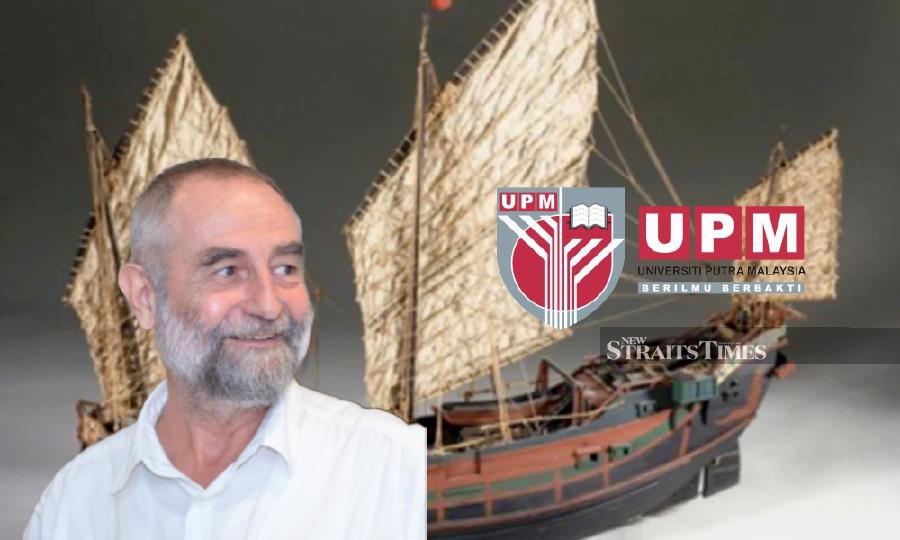 |
| French historian Serge Jardin describes Universiti Putra Malaysia (UPM)’s defence as ‘a joke’. - NSTP file pic |
KUALA LUMPUR: The response by Universiti Putra Malaysia (UPM) in defending their academics alleged to have misrepresented facts about Malay maritime history has completely fallen flat and can be easily proven wrong, said French historian Serge Jardin.
Jardin, who had previously called out two UPM academics on misrepresenting historical facts related to Malay jongs in a paper published in an academic journal, questioned how it was possible for an expert– if the paper went through a blind peer review as claimed by UPM– to not have spotted the difference between a Chinese junk and Malay Jong.
He calls their defence "a joke".
"Their (UPM) answer is a joke."
"Are we speaking of a peer blind review or are the so-called experts blind? How is it possible for an expert not to see the difference between a Chinese Junk and a Malay Jong. Have you ever seen a Malay boat with a pair of eyes at the bow, which clearly belongs to Chinese culture?" he told the New Straits Times.
"How can a maritime expert confirm the galley (ghali) was used in Melaka, in the Sultanate of Melaka fleet, before the arrival of the Portuguese and the Ottomans in Southeast Asia? There is no historical source to sustain that affirmation," he added.
In responding to UPM's statement saying that the field of social sciences and humanities is open to various interpretations, Jardin had this to say:
"I agree, history is about the interpretation of the past, but this interpretation is based on historical evidence. Empirical evidence, as the two examples given above (on confirming the use of galleys in the Sultanate of Melaka fleet before the arrival of the Portuguese and the Ottomans in Southeast Asia), are not negotiable."
Jardin also raised other points concerning the credibility of the journal, International Journal of Academic Research in Business and Social Sciences, that the paper was published in.
He argued that while UPM passes it as "peer reviewed and reputable", a check on the journal's website reveals that it is a "pay to publish" journal.
"That article which UPM defends as being peer reviewed and reputable, was published in the
'International Journal of Academic Research in Business and Social Sciences' with Human Resource Management Academic Research Society (HRMARS) being the publisher.
"A check on their website indicates that this is a 'pay to publish' journal, with a fixed fee being charged as 'article processing charges' so that it can be 'open access'."
Jardin further explained that the publisher, HRMARS, is listed as a predatory publisher, as found in Beall's list.
Beall's list is a widely used reference for researchers and academics to identify exploitative publishers and detect publisher spam. The list– originally created by Jeffrey Beall, a librarian and researcher from University of Colorado, Denver, who coined the term "predatory publishing" — documents open-access publishers who do not perform real peer review, effectively publishing any article as long as the authors pay the article processing charge.
"HRMARS is listed by Beall's list as a predatory publisher," Jardin said, adding that the journal in question can be found in Universiti Kebangsaan Malaysia's (UKM) list of predatory publishers and journals, remarking it (and other journals on the list) as "not recognised".
"UKM has even put up a list of predatory publishers/journals, which can be found on this website,
" 'Tidak diiktiraf' (not recognised) by UKM but good enough for UPM?" he argued.
At the very least, he added, UPM should follow UKM and blacklist the journal.
Jardin also encouraged people to check for themselves to look for HRMARS in Beall's list on its website, and learn more about predatory publishers.
Following the claims by Jardin, UPM responded by saying that the article which was published in the said academic journal included a list of referees from the educational research abstracts database, and this complied with the policy of blind peer-reviewed journals.
"This means that the research has been scrutinised by experts in the field, unrelated to the researcher, to avoid conflicts of interest and confirm the study's findings.
"UPM takes the allegations directed at the university seriously in this academic context.
"Given the academic nature of the research, UPM believes it is appropriate to discuss this issue within an academic space," the university said in a statement.
They added that the field of social sciences and humanities is open to various interpretations.
© New Straits Times Press (M) Bhd
from
https://www.nst.com.my/news/nation/2024/01/1005467/upms-defence-joke-says-french-historian-disputed-academic-paper















0 تعليقات